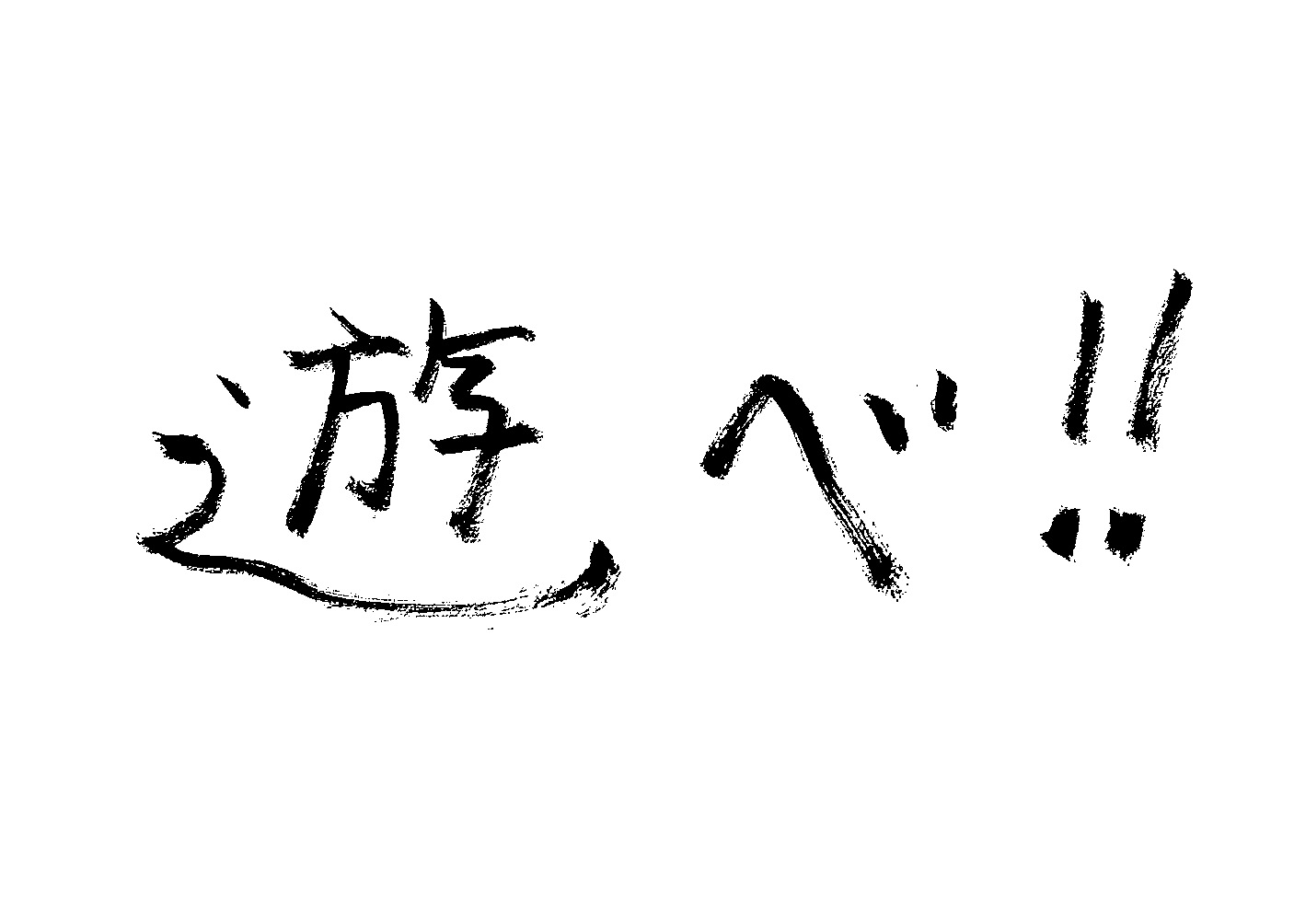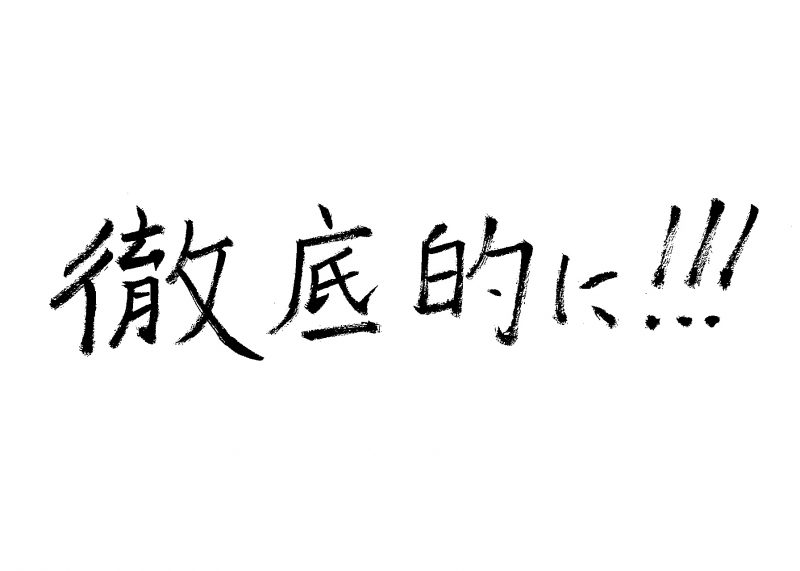niime 百科
Encyclopedia of niime
niime20分対談
「遊び」について 〈前半〉
niime's twenty-minute talk
About 'play'〈part 1〉
「遊び」について 〈前半〉
About 'play'〈part 1〉

2019 . 10 . 15
今回のテーマは「遊び」。仕事をワクワクする遊びと捉えるふたりによる、「niime的遊び論」。子ども時代の遊びのリアルな記憶に始まり、遊びとは?をざっくばらんに掘り下げます。
酒井「遊びって、やりたいことの究極やん?今は遊びが理屈っぽくなってる。子どもの頃の遊びの方が“立体感”があったと思う。」
玉木「答えがすぐにわかると妄想するチカラが働かない。何かをしよう、という脳の思考が大事なんじゃない?」
酒井「遊びって何か子どもの時からの話にならん?」
― そうですね。
酒井「子どもの時の遊びと大人になってからの遊びは違うでしょ。」
― その違いとは。
酒井「小学校時代は外へ遊びに行って、なんでもないことをして、なんでもないことを遊びに出来たでしょ。でも大人になるとそういうわけにはいかなくなるでしょ?」
― 意味が必要だったりするということですか?
酒井「そうなんですよ。そこになんつぅかなぁ…」
玉木「それ、昨日話してたことと繋がるやん。例えばハイキングを趣味にしようとしたら服を買うところから始めるでしょ?ハイキングするなら、ただ山に向かって歩き出せばいいのに、やれ上着買う、装具を揃える、と買い物からスタートさせるのが大人の遊び方で。」
酒井「カッコウから入る。」
― あぁ、なるほど。
玉木「子どもは別にそこにあるもの使ってチャンバラごっこしてみたりだとか。」
酒井「うん。」
― 確かに。
玉木「自然だったら自然相手に、何が出来るか。コレしてみる?アレしてみる?みたいな。」
酒井「なんか自分がちっちゃい頃に、近くに大きな川があったんで、河原で友だちと木のクズ集めて来て自分たちで竪穴式住居みたいなの作って。そういうのが楽しかったりとかさ。」
― それって突然思いついて、やろう!という話ですか?
酒井「そうそう、突然思いついて。でもなんか、やるぞ!って感じでもないんですよ、自然と木クズ集めて来て…出来た!みたいな。」
― 特に目的とかもなく、やってるうちに出来ちゃったという。
酒井「それが大人になると、やれワークショップだとか、なんか、そういう決め事がないとやらないでしょ?」
― カテゴライズというか。
酒井「うん。」
玉木「やらないっていうか、やれないんだ。…ってことは、tamaki niimeも無計画でいいね。」
酒井「オレにとって、そもそも仕事自体が遊びやからさ。それこそもう…全部が遊びなんですよ。」
玉木「それは私もそうやで。百姓仕事なんかも本来遊びじゃない?」
― 百姓の定義って別に決まってないですもんね。何やってもいいっていうか。
玉木「百種類あるって事でしょ。」
酒井「でも大人ってなんで遊べなくなるんやろ?」
玉木「遊ぶ理由が欲しくなるのかな?…ゴールを、意味を考え過ぎるから。」
酒井「例えばパートさんなら稼ぐために仕事に就くとかさ。社員でも月給やボーナスをもらうために仕事をすると。」
玉木「何々のためにする。遊びにしても、スキーが上達するためにスキー場に行くとか。遊びというよりは技術の習得が目的になっちゃって。愉しむということよりも。」
酒井「遊びって、やりたいことの究極やん?やりたくないことをやってないやん遊びって。でも仕事とかってやりたくないこともやらなきゃいけない。でもオレの場合、遊びなもんやから、やりたくないことをやらないんですよ。やりたいことだけをやる。楽しいと思えることだけをやる。オレの中では遊びイコール楽しいこと。それは仕事であれ、プライベートであれ。ゲーム感覚ってゆうのかな。」
玉木「子どもの時って時間をつぶすために遊んでいる。家に帰るまでのその時間を愉しむために。今日何やって遊ぶ?みたいな。」
酒井「時間をつぶすってなると遊ぶ一歩手前に思考が入るけど、でも子どもの時ってそんな理屈は無くない?なんかブァーッとテキトーにやって。」
玉木「そこにはなんの計算もない?」
酒井「なんもない。」
玉木「じゃなんで計算するようになったん?」
酒井「子どもの時の遊びってただ純粋に、ライヴ感ってものがあるんやと思う。別に決め事もないし。」
― 結果を求めてないんですね。
酒井「うん。」
玉木「何かをしよう、という脳の思考が大事なんじゃない? 別に何かをしなければいけないわけじゃない、何かをしてもいいし、しなくてもいい。でも本来、何もないところから何をするか考えるところが大事。」
― クリエイティブじゃなきゃ、と。
玉木「そう。」
酒井「昔は自然から教えてもらって自然から遊びを育むってゆうのがあったけど。川で飛び込めるとこを見つけて皆んなで飛び込んだりとかさ。今やと、川に行ったらアブに刺されるやんとか、無駄に防衛本能を働かせるというか。」
― 禁止事項が多かったりして。
酒井「そうそう、理屈っぽくなってる。昔の子どもの遊びの方がやってることに“立体感”があったと思う。今は平面的というか2次元的な気がする。マニュアルどおり、カリキュラムどおりにやりましょうね、みたいな。子どもの頃はオモロないと思う間もなくその場その場で楽しいことを…」
玉木「どんどん閃けてたってこと?」
酒井「そうねん。ああしようぜこうしようぜみたいなのをもっと自然に出来てたというかさ。で、今日は楽しかったね、バイバイみたいな。」
玉木「じゃ何々ちゃんまた明日!みたいな感じやろ?」
酒井「そうそうそうそう。」
玉木「わかるよ、その感覚はわかる。」
酒井「そこに変な理屈がない、っつうか。もっとざっくばらんやし、大人からしてみたら、あの子ら何やってるん?わけわからん、というような感覚やと思うんよ。」
玉木「それは大きくなって余計な情報が入り過ぎたってこと?」
酒井「入り過ぎたってこと。」
玉木「そうゆうことやなぁ。」
酒井「だから本当の意味でフラットで余計なバイアスが全くかかってない状態。子どもの時の、ただ遊ぶことだけに集中する純粋さってすごいと思う。」
玉木「私は今tamaki niimeをやってることすらも遊びやと思う。」
酒井「そらそうや。」
玉木「ショールを開発してる時も、採算とれるかどうかは勿論重要やったけど、それよりも、あの頃って無我夢中で織機と遊んでたな。」
酒井「うん。でも今、めっちゃ考えるやん。」
玉木「いや考えるけど、それを愉しんでるってゆうか。だって、子どもの頃に秘密基地つくるんだって考えてたやろ?こっちに窓付けたら可愛くない?とかオモロくない?とか。」
酒井「オモロくない?とかいう中途半端な概念さえももう無いんやって。子どもの頃って、結果的に出来たもんがヤバいってゆうかさ。出来たもんに対してディテールがどうだとかフォルムがどうだとか無くて、もうざっくばらんに組み上げたものが、あ、やば。みたいな。」
玉木「直観的にやろ?」
酒井「やったな、yeah〜!!っつって。」
玉木「…。」
酒井「今ってあれこれ言うやん?オレもやけど。なんぼ遊びっていっても、それが世に出るわけで。」
玉木「そこは世に出すか出さないか、そこら辺やって、あれこれ言ってるのは。」
酒井「子どもの時は無茶出来たよな。」
玉木「それは無知だからこそや。」
酒井「だから遊び=無我夢中な子どもってスーパーだよね、っていう。」
―(笑)。
酒井「今の子どもって、正直観てると、冷めてるな〜って思うもん。」
玉木「なんでも簡単に出来ちゃうし、情報すぐ入れられるし。料理なんかでもネットで検索したら全部動画で観れちゃうから、やる前から完成形が想像出来てまうねん。」
― そこで負荷がかからないというか。
玉木「答えがすぐわかるから、妄想するチカラが働かないし。イージー過ぎんじゃない?生きるってことが。」
酒井「ちっちゃい頃の遊びって、0から1なんやけど、大人になると1から2、2から3になってしまうよな。コーディネートってゆうか。」
玉木「組み合わせでしかなくなるからな。」
酒井「そうねんそうねん。特に今情報過多やから。」
玉木「余計な情報あり過ぎるし。」
酒井「もっとオレらのちっちゃい頃って、“0から1感”あったよな?」
玉木「まだまだ携帯もなかったしね。情報は本からしか入れなかったしね。その違いはおっきいかもしれないね。情報が少ないからこそひとつのことを掘り下げれたの。石投げというしょうもない遊びも、もっとこうやったらもっと飛ぶで〜とか。しょうもないんだけど(笑)。」
― 本人たちは楽しいから。
玉木「そう、無茶愉しんでこんなのもありでこうも出来るというのを深掘りしていくから脳は活性化していくけど、今はもう調べて終了、みたいな感じ。」
酒井「もっと本気で遊ばなあかんな。」
玉木「皆んなもう、携帯捨てよっ。」
〈続く〉
対談2回目にしてお約束の20分をはるかにハミ出し……「遊び」をめぐる玉木と酒井によるディスカッションはテキトーな収拾をつけることなく熱く延々と繰り広げられていく。果たしてこの先にはどんな結論が待っているのか?次回をご期待ください。
書き人越川誠司
This time our topic is “play”. Tamaki and Sakai see their work as a form of exciting play, as they call “niime’s play theory”. They began to talk about vivid memories of games in their childhood and then investigated frankly what “play” is.
- Sakai
- Playing is the ultimate thing that we want to do. Nowadays people consider things so logically. When we were kids, playing was more three dimensional.
- Tamaki
- You cannot use your imagination if you could immediately find the answers. It is more important to allow your mind to work to inspire you.
- Sakai
- I think everyone comes up with the concepts they had when they played during their childhood when you really think about what playing was.
– Indeed.
- Sakai
- Playing in your childhood and adulthood are different, aren’t they?
– What are the differences?
- Sakai
- When we were elementary school kids, we went out to play and it was nothing extraordinary. We could enjoy anything, right? But as we get older, we can’t do that anymore.
– Because we need something with a deeper meaning, right?
- Sakai
- That’s right. That is……
- Tamaki
- It connects to what we talked about yesterday. For instance, when you want to hike as your hobby, you often start by getting your hiking outfits, don’t you? If you’re going hike, you simply need to start walking toward a mountain, but for adults, we tend to start shopping for outfits or collecting goods.
- Sakai
- We try to start with trying to look good.
– Oh, I see.
- Tamaki
- Children just use the things around them and have fun.
- Sakai
- Yeah
– That’s true
- Tamaki
- Tamaki: If there are just natural objects there, they try what they try to do what they can with them then and there.
- Sakai
- When I was a little kid, there was a big river nearby. I went there to pick up tree branch scraps with friends and built something like a pit house. That was a fun memory.
– Did you come up with those ideas all of a sudden?
- Sakai
- Yeah, all the sudden. We didn’t even try hard. We simply collected wood scraps and played with them, then made it! Just like that.
– There was no specific goal. You just happened to make it while you were playing, with them, right?
- Sakai
- But, as you grow up, you don’t do it without planning such as workshops. Without specific plans, you don’t do it, do you?
– You kind of need to organize it?
- Sakai
- Yeah…
- Tamaki
- Grown-ups don’t or can’t do something without planning. That means ‘tamaki niime’ should not have a plan.
- Sakai
- For me, my work itself is play. Actually, all my work is fun.
- Tamaki
- Same here. I think farming works are ‘playing’.
– There is no definition of what farmers should do. They can do anything…
- Tamaki
- There are a hundred ways, aren’t they?
- Sakai
- I wonder why we can’t enjoy that kind of thing as you grow up.
- Tamaki
- I think we want a reason for playing. We overthink about meanings and goals.
- Sakai
- For example, part-time-workers get jobs to make money. Even full-time-workers do their jobs for salaries and bonuses.
- Tamaki
- We always do something for specific reasons. Even in playing, we go skiing for improving skills. The purpose is to get skills not to enjoy playing. The main reason is not for enjoyment.
- Sakai
- Playing is what we want to do the most. When we want to do something, we don’t do what we don’t want to do, however, for me, my work is playtime. I don’t do what I don’t want to do. I just do the things what I think it is fun. In my policy, “play” has to be fun either at your work or at your personal times. You should have fun just like when you’re enjoying playing games.
- Tamaki
- Kids play to kill time in their childhood. On the way home, they want to enjoy their time. Like, “What do you wanna do today?”
- Sakai
- As you get older, you would consider to choose about “play” when you have time to spend. But children wouldn’t think of such ideas. They just do whatever they want.
- Tamaki
- They don’t factor that in.
- Sakai
- No. Absolutely not.
- Tamaki
- Why do we make such calculations?
- Sakai
- Children just enjoy playing purely. There is no rules for enjoying.
– They don’t ask for results.
- Sakai
- Yes.
- Tamaki
- Isn’t it important to just think that you want to do something fun? You don’t have to do it, or it is ok to do it or not to do it. However, basically it is essential to have an idea to think up what to do even while you have nothing to play with.
– You have to be creative.
- Tamaki
- Exactly!
- Sakai
- We used to learn from nature. We improvised our play from the natural materials around us. For instance, we found the river to dive into and tried it. Today, we worried about being stung by insects. Uselessly, we guard ourselves.
– There are too many prohibited matters.
- Sakai
- Yeah, we are too logical. Children in olden times, they were more three dimensional, I mean indepth, more flexible to see and do it. Today, we are more simple or two dimensional. We tend to follow manuals and instructions. When we were kids, we did exciting things one after another, there was no time to be bored.
- Tamaki
- Were we so inspired more?
- Sakai
- Exactly. We had ideas here and there and played naturally. And at the end of the day, they say, “Oh, we had so much fun, bye!”
- Tamaki
- It was not a big deal for them, like “Ok, see you tomorrow, guys!”
- Sakai
- Yeah, yeah, yeah, yeah.
- Tamaki
- I understand that feeling.
- Sakai
- There are no reasons behind. It is more frankness. From the sight of adults, they don’t understand what kids are doing.
- Tamaki
- Is that we put too much information as we get older?
- Sakai
- I guess so.
- Tamaki
- Indeed.
- Sakai
- That’s why kids don’t have any bias and are so pure in their meaning. I think it is funtastic that kids can focus on playing.
- Tamaki
- For me, I think running ‘tamaki niime’ is one of my ways to “play”.
- Sakai
- Of course!
- Tamaki
- When we were creating shawls, of course, it was important to make money, however, more than that, we were so invested in playing with looms.
- Sakai
- Yeah, but now we consider a lot.
- Tamaki
- Even so, we enjoy it. You know, when you were a child, were you planning to make a secret base? Is putting a window here cute or exciting?
- Sakai
- There was no such concept if it was interesting or not? The products kids made while in childhood were awesome because they had no explanation of details or forms, they just created it as they wished, and it turned out to be so great.
- Tamaki
- They guided by intuition,right?
- Sakai
- They shouted, “Yeah! Wow! We made it!”
- Tamaki
- …….
- Sakai
- Nowadays, people consider and calculate here and there. I am not an exception. Even we claim this is our play, our products go out to the world.
- Tamaki
- The products go out or not is the reason why we have to consider so much.
- Sakai
- When we were kids, we did crazy things.
- Tamaki
- Because we were so ignorant.
- Sakai
- That’s why I think children just indulge in playing are incredible.
———(laugh)
- Sakai
- Honestly, I think today’s children are not excited.
- Tamaki
- They can do things quickly. They can get information so readily. For cooking, we could check recipes on the web, and see how to make it on YouTube. They can see the finished products before we try to make it.
– There are no challenges.
- Tamaki
- Because we can get answers so easily, that’s why we don’t have to have imaginary thoughts. It is too easy to live.
- Sakai
- When we were small, how we played was like zero to one, however, Once we grew up, it is like one to two or two to three. Maybe like coordination.
- Tamaki
- It is the only combination.
- Sakai
- Absolutely! Especially since we have too much information now.
- Tamaki
- There is too much information we don’t need to know.
- Sakai
- When we were kids, things start from zero and go to one.
- Tamaki
- We even didn’t have cell phones yet. We have too much information just from books. I think that difference is so big. Because of less information, we could try to seek it out. We had to think of ideas of how to do better at just throwing stones. It’s silly, isn’t it?
– But kids had so much fun.
- Sakai
- Yeah, they enjoyed so much, finding many ways of doing and seeking the ways sincerely. Their brains were active, but today we just check it on the web, and that’s it.
- Sakai
- We need to play seriously.
- Tamaki
- Yeah, we need to throw away cell phones.
– continued –
The second talk ended after passing the 20-minutes. Their discussion about “play” didn’t wrap up with a definite conclusion, but we will continue to passionately discuss the topic. How would this discussion continue next? Please look forward to reading the next instalment.
Original Japanese text by Seiji Koshikawa.
English translation by Adam & Michiko Whipple.


